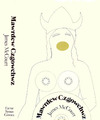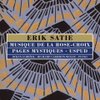 Having noticed that James McCourt has written seven books, years after I (and possibly most others?) had assumed he would never be a prolific author; and realizing that, after an Amazon order of three of the newer ones, I now have them all; and starting to think of his career as almost backwards from the norm – he is someone who wrote an 'ultimate' book first, in 1975, then went back and started to try to live in that universe, to fill things in, to occupy spaces that had already been made impossibly ethereal and transcendent – and, stuck for a couple of decades writing the kind of fragmentary stories that suggest an already ended career, he has become confident and fertile since the millennium; and on top of all that while reading his second book again, Kaye Wayfaring in 'Avenged' (1983-5), and I think probably making sense of it for the first time (as it is clearly not a book for anyone under the apparent age of a particularly reflective forty-something)...
Having noticed that James McCourt has written seven books, years after I (and possibly most others?) had assumed he would never be a prolific author; and realizing that, after an Amazon order of three of the newer ones, I now have them all; and starting to think of his career as almost backwards from the norm – he is someone who wrote an 'ultimate' book first, in 1975, then went back and started to try to live in that universe, to fill things in, to occupy spaces that had already been made impossibly ethereal and transcendent – and, stuck for a couple of decades writing the kind of fragmentary stories that suggest an already ended career, he has become confident and fertile since the millennium; and on top of all that while reading his second book again, Kaye Wayfaring in 'Avenged' (1983-5), and I think probably making sense of it for the first time (as it is clearly not a book for anyone under the apparent age of a particularly reflective forty-something)...
That second book always felt fragmentary, fairly 'post-', as do the Kaye Wayfaring stories published in 2002: if Mawrdew Czgowchwz (I write that without checking the spelling, but I promise I'll do so before publishing this blog entry – this is, after all, about the problem of hubris) is perfect, it leaves no room to continue, so it's a bit tough (as much as it is attractive) that now three books, and a projected two or three more, are going to take place in that same narrative universe.
It's almost as though, rather than going backwards in narrative time and phylogeny to the Silmarillion (impressive but boring – too archaic a style for me) and massive tomes of back histories, Tolkien had written a book about the third through the eighteenth years of Aragorn's reign. I mean, really: of course they lived happily ever after, of course they were terribly successful for a very long time, but can you anyone imagine writing about it?...
(Remember of course that I'm writing this without having quite finished my rereading of that second book, or the third or fourth that are already written, let alone the ones he's working on now. So I'm bound to be wrong and unfair. But to some extent this is about my personal response to the books, not what's actually in them.) (And that, my dear, is what we call hermeneutics – don't you dare ever quote me on that.)
Here, then, is the difficulty: Mawrdew Czgowchwz (okay, that time I couldn't deal with not knowing so I checked the spelling, and had indeed missed out on the last 'w' – the same frustration popped up this semester when I was teaching about Darmstadt and high modernism, as thrice in four months I had to write Penderecki's first name on the blackboard, and it probably came out differently each time – why can't we just call him Chris?), the novel, ends in transcendent space. The problem, the canker, enters with the introduction of the truly fabulous young countertenor Jacob Beltane, who styles himself an 'oltrano'; and since Mawrdew (I can spell her first name just fine, heck I'll just stick with that) is transcendent, parodically but also truly the operatic ultimate in that she is successful and amazing at absolutely everything (and perhaps you can see my problem on the horizon), she must inevitably meet the handsome young Englishman, start to sing beyond the limitations of vocal ranges (ah, hubris – when real singers do this their voices start to disintegrate), and finally marry him, bear twins, and travel off to the unreal New England island of Manitoy to hold arts festivals of archetypal, ultimate works.
So where do you go from there?... the end of the 1975 novel is unreal and in fact almost but not quite satirically so, the last fifty pages or so going off into a dream of perfection, of artistic and living transcendence, of no more problems possible, of art without restraint, without reality, ultimately without flaw. Given that part of my personal reaction to the book is one of insecurity and inadequacy (the writing is amazing but also amazingly difficult, and also of an over-the-top difficulty that sort of outdoes Ulysses, though fortunately not Finnegans Wake; the main characters are astoundingly successful, increasingly rich, and can do anything, including speak many languages, perform in many media, and have ultimately perfect parties, where they improvise pastiches of the entire history of music at the harpsichord and write acrostic sestinas for each other), the unreality of the ending is almost comforting, as it soothes my excited but affronted narcissism by becoming just beyond-everything, by becoming so obviously unreal that it is no longer a challenge to my own talented but inept life.
I don't know if Wayne Koestenbaum said anything about gay narcissism in his forward to the NYRB reprint edition of Mawrdew Czgowchwz (I have the old Noonday Press paperback, simple but lovely with a perfect cover – a basic cartoon of an operatic Walküre with an open mouth, and that mouth is filled with the only color, a patch of solid gold), but he should have. The whole is an experiment, not only in camp extravagance, but in longings for perfection, for the complete narcissistic inflation of all values – it becomes a universe where everything we imagined we could do would actually come to pass (Sondheim would surpass his four journeyman musicals and two college productions to write a slew of real shows, and some of them would even make it to film; or, to speak of the many, many also-rans, Heggie's operas would have been a continuing success, Disch would not have collapsed into cynicism, Rorem would have been worth taking seriously, etc., etc.).
So after indulging all those narcissistic desires in your first novel, published when you are (I mean he is of course) thirty-four years old, what do you do then? His next major invented character, Kaye Wayfaring, who also occupies Mawrdew's universe and gets to become her sister-in-law, is also amazingly fabulous but much more flawed: part of the more 'tainted' world of film, with a frankly rather tawdry Georgia family background that has 1930s-novel suggestions of incest and abuse along with the vicious figure of her suicidal mother. In that version of this narcissistic world, Mawrdew is older (65 by my count – yes, I actually did a Word chart of all of McCourt's novels, their publication dates, and the apparent dates that happen within the narratives, and figured out when Mawrdew and Kaye were born) and she watches snow fall, throws the I Ching to advise the younger woman, and maintains a quiet, rather cryptic position as the Voice from Beyond. It may not be accident that Kaye is exactly McCourt's own age – so this is evidently a coming to terms with the flaws and disasters of real, as opposed to imagined, life – but we're still trapped in the vast demands of Mawrdew's transcendent universe (perhaps that is why, although the older woman is always kind to the younger one, Kaye often thinks of Mawrdew as savage competition, as unfair comparison).
And where is the young, transcendently beautiful but admittedly rather boring character of Jacob Beltane? Did he die in a convenient soap-opera-type accident, leaving a mourning diva and two handsome sons? Naturally I need to read the 2002 stories, where Mawrdew will be from 68 to 85 years old – or perhaps she will actually die in the course of that book, I haven't read them yet – and you can see what I'll be watching for. But even without knowing exactly what narrative games McCourt will play to make his universe work, like eighteenth-century clockwork patched with parts made of more modern metals, that same vast problem looms on the horizon: if you really got everything you had dreamed of when (narcissistically) younger, in art or in life, then what the hell would you have done afterwards?
... and so... did I tell you I've met McCourt? I have letters I've written to him after we met, in 1993 and 1995; I don't know where his letters to me (probably only two or three of them) are, probably in the boxes still to go through in the front room. I'm sure that when we did meet, possibly in New York in 1987, possibly in Los Angeles in 1991, I gushed and told him how much I loved Mawrdew – and also talked with him about Time Remaining, the (again fragmentary but more successful) third book from 1993. (That chart of mine really does come in handy.) I actually published a book review of the latter – which is rather strange, as now I can't even remember reading it. It is an AIDS novel, and I'll probably need to reread it in the coming weeks; hopefully I won't be too exasperated by its extremely New York-centric nature (which continues in his sixth book, the quasi-history Queer Street from just three years ago, which is essentially about New York as the gayest place on earth – an unfair challenge to we Californians, as of course the New Yorkers have all the big publishing houses and can tell the story any way they want).
You will see that, psychologically at least if not narratively, the fact that I know McCourt is tied to this whole world of fame, fabulousness, narcissism, and dreamed-of success: it reminds me of the other Great Gay Writers I know – Armistead (as late as 2002 a very close relationship, I said with an eyebrow significantly raised), Alfred Corn (despite squabbling over some years, we reconnected when he moved to London three years ago – again I was somewhat intimidated by his successful-New-York grandeur), Edmund White (who thought I was cute – this is admittedly years and years ago, and I can't help regretting I didn't follow up on those compliments), Paul Monette (the poet who became an Angeleno screenwriter, and then poster boy for gay writers who had AIDS – and yes, Virginia, he knew my name), Adam Mars-Jones (who isn't quite in the same category, being closer to my age and not as famous as the others – Adam seems practically human, in fact, being chatty and self-involved and fun).
It even reminds me of that amazing stratospheric climb of 1976, when I was just nineteen, and a handsome (though admittedly rather short) architect flew me from my Virginia university up to New York, and dragged me around the city and the ritzier suburbs in Connecticut to meet his famous friends, which included architect Philip Johnson, painter Paul Cadmus, impresario balletomane Lincoln Kirsten: and I had a dazzling vision of knowing Just Everybody – which I then screwed up by not sufficiently wanting to Do It with the architect. My brushes with greatness: my brief meetings with the denizens of those circles of the famous, all of whom seem to know each other, at least to some extent – and around all of whom I have experienced my own worst deadly sin, Invidia, instead of the sins that I might have had if I'd gotten to join the gay mafia: Superbia and Vanitas (and, if I'd played my cards right, Luxuria).
So this post, about oltranos and 'ultimate' art, about narcissism, perceived or real greatness, success and fame, and transcendence, comes back to earth with a bit of a bump. A bump that is a relief: because of course I have flown almost too high in the strenuous cumulus of McCourtian prose, with its tangled sentences full of hesitations and backtracking, drenched with knowing references and campy asides, full of that exquisite narcissistic arrogance which simply assumes that you, Dear Reader, will actually battle through each paragraph; and that it will do you good.
This post is most definitely for my beloved Mitchell, who is probably the only person who will have enough patience with these knottily entangled sentences and obsessions to get to the end of them all. Hiya, M.



